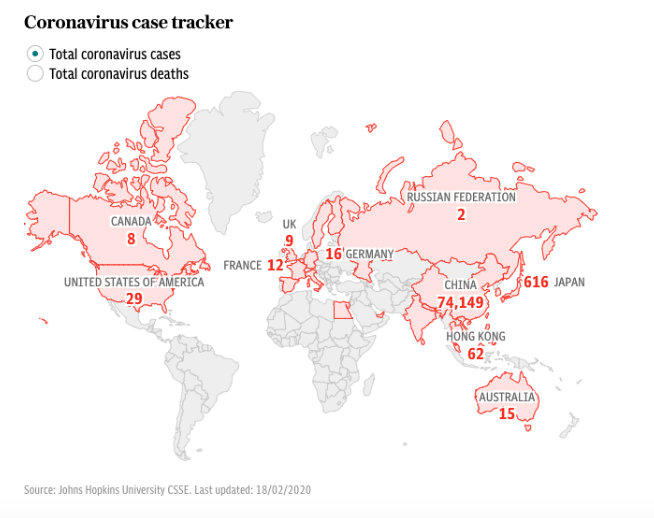Can blockchain technology help fight coronavirus?

Since the coronavirus (COVID-19) outbreak was first reported at the end of 2019, more than 75,000 cases have been confirmed and the death toll has risen to over 2,000 people worldwide.

Healthcare professionals are working around the clock to care of those infected with the virus. Scientists are racing to find a vaccine. Governments are doing everything in their power to contain its spread.
Amidst these efforts, blockchain technology has increasingly been mentioned as a tool to assist with various aspects of containing the outbreak. But is this a case of media hype, or could it provide a genuine tool?
Securing patient privacy
According to domestic Chinese news outlet People’s Daily Online, at least 20 blockchain-based applications have been designed to help fight the coronavirus outbreak. These are touted as performing a variety of different functions.
In order to provide effective and ethical care, respecting and maintaining patients’ privacy is of vital importance. It’s imperative patients feel comfortable sharing critical information with physicians in order for them to receive the best care, and to mitigate the spread of diseases. The quality of data collected during an epidemic is directly related to how honest and open patients feel they can be with healthcare workers attending to them. Above all, privacy is a basic human right that needs to be preserved.
In Xi’an, northwest of China’s Shaanxi Province, a system for online consultation and screening was launched at the beginning of February. Using blockchain technology they’re able to securely manage health records, ensuring interoperability without compromising patient privacy and security.
Payment platform, Alipay has also applied blockchain technology to protect people’s personal information. They have created an information platform on their mobile app to enable collaboration with transparency and efficiency when it comes to the management, allocation and donation of relief supplies.
The Zhejiang Provincial Health Commission and the Economy and Information Technology Department have leveraged Alipay’s blockchain-based platform to enable the review, recording and tracking of demand, supplies and logistics of epidemic prevention materials. As supply chains involve multiple parties from donors and recipients, to warehousing and delivery logistics, the entire process of record and verification by each party is tamper-proof, while also allowing anyone to track the process.
Tracking the virus
Jim Nasr, CEO of blockchain-enabled applications developer Acoer describes containing the coronavirus as a data management issue. He speaks of epidemiologists, the professionals who study how diseases spread, being faced with the task of gathering, verifying and cleaning data in an efficient manner. He explains they need high-quality data to model viruses. Using these models they’re able to provide governments with recommendations about how to contain the virus. But if that data is difficult to access or inaccurate, it’s completely useless. Blockchain technology can be used to manage real-time data and importantly, to ensure its integrity.
Acoer has created a data visualisation tool called HashLog to track the deadly virus. The HashLog data visualisation engine interacts in real-time with Hedera Hashgraph’s distributed ledger technology allowing researchers, scientists and journalists to understand the spread of the coronavirus and its trends over time through visuals on the HashLog dashboard.
Faster payments for victims
English-language local news outlet, South China Morning Post reported earlier this month that Chinese online mutual aid platform, Xiang Hu Bao has added the coronavirus to the illnesses eligible for the maximum one-time payout of around 100,000 yuan ($14,300). Xiang Hu Bao is not an insurance policy, but a blockchain-based collective claim-sharing platform serving around 104 million users. According to the report, blockchain technology has been used to prevent fraud and allow for faster claim processing.
Xiang Hu Bao is owned by Chinese financial firm, Ant Financial, and uses its mobile payment processing service AliPay to fund the payouts for coronavirus victims with its own capital.
A spokesperson for the firm explained that: “Xinag Hu Bao has been able to process claims and make payouts to participants quicker, due to the decentralised trust-free nature of blockchain technology […] Claim applicants can submit their supporting documents as evidence while investigation firms can get immediate access to them on the blockchain. All parties involved can see the entire process.”
Blue Cross Insurance, owned by the Bank of East Asia is also helping decrease the bureaucratic impact of the outbreak through a medical claims app.
Patrick Wan, managing director for the insurance company, told South China Morning Post: “Our blockchain-backed claims service has played a key role during the outbreak of the coronavirus by totally eliminating the paper process and need for back-and forth documents delivery to clinics. […] This really helps to mitigate the risk of infection from face-to-face contact.”
The company claims its platform is able to manage over 1,000 transactions per second without human involvement. Patients are also able to see their claims within a day after their hospital visit, which is vitally important for those seeking treatment.
Innovation in time of crisis
This is not the first time blockchain has been applied to track disease. There have already been a number of initiatives using blockchain and distributed ledger technology to track the origins of food, for example. The IBM Food Trust has already been using blockchain to help improve food safety by managing and conducting food tracings in order to identify sources of contamination for occurrences of Salmonella. By being able to identify the cause quickly and effectively, it’s much easier to contain the problem and treat it at the source.
Ultimately, blockchain technology is also most certainly not going to solve this crisis and potential use cases shouldn’t be overhyped as a saviour to such a devastating problem. It is, however, one tool that could be deployed and it is encouraging to see governments embracing the use of disruptive technology. The coronavirus is an ongoing global crisis; the pain and suffering caused is huge. Technology can hopefully play an important role in helping governments to act quickly based on factual information.
Keep reading…
Top crypto trends to watch out for in 2020
Bitcoin futures are growing in popularity, but what are they?
 Discover
Discover Help Centre
Help Centre Status
Status Company
Company Careers
Careers Press
Press


